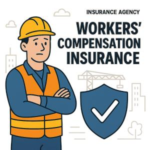
High-Risk Senior Home Care Workers’ Comp: Navigating the Assigned-Risk Pool
August 19, 2025
Coverage Options: Light Industrial Staffing Comp
August 20, 2025In the complex landscape of employment regulations,recruitment agencies operating in Georgia face unique challenges when it comes to workers’ compensation compliance. Understanding the nuances of Georgia’s workers’ compensation laws is critical for these agencies to manage risk effectively, maintain legal compliance, adn protect both their business interests and the workforce they place. This article provides a comprehensive overview of Georgia’s workers’ compensation requirements tailored specifically for recruitment agencies, highlighting key obligations, coverage specifics, and best practices for seamless adherence to state mandates.
Table of Contents
- GA Workers Comp Requirements for Recruitment Agencies Understanding Legal Obligations and Compliance Strategies
- Risk Assessment and Coverage Options Tailoring Workers Compensation Policies to Recruitment Industry Needs
- Claims Management Best Practices Minimizing Disputes and Enhancing Employee Support
- Proactive Recommendations for Recruitment Agencies Ensuring Cost Efficiency and Regulatory Adherence
- Q&A
- concluding Remarks
GA Workers Comp Requirements for Recruitment Agencies Understanding Legal Obligations and Compliance Strategies
Recruitment agencies operating in Georgia must adhere to specific workers’ compensation regulations that protect both their temporary workforce and permanent employees. In essence, workers’ comp coverage is mandatory for agencies with three or more employees in Georgia. This includes any staff members on payroll as well as temporary workers assigned to client businesses. Understanding the classification of employees and their assignment agreements plays a crucial role in ensuring accurate coverage. Failure to comply can lead to ample penalties, liability claims, and legal complications, emphasizing the need for agencies to maintain diligent documentation and ongoing policy reviews.
To navigate these complex regulations effectively, recruitment agencies should adopt comprehensive compliance strategies. These typically involve:
- Conducting regular audits of payroll and assignments to verify coverage applicability
- Engaging with specialized insurance brokers to tailor workers’ comp policies suited for contingent workforces
- Providing training and dialog to both internal staff and placed candidates about safety and claims procedures
- Maintaining detailed incident records to streamline claims processing and minimize litigation risks
| Requirement | Applicability | Potential Penalty |
|---|---|---|
| Mandatory Workers’ Comp Coverage | Agencies with 3+ employees | Up to $5,000 fine per occurrence |
| Timely Claims Reporting | All covered employees | Delays can increase liability exposure |
| Safety Training Documentation | Temporary and permanent staff | Failure may affect claim outcomes |
Risk Assessment and Coverage Options Tailoring Workers Compensation Policies to Recruitment Industry Needs
Recruitment agencies face unique risks that standard workers’ compensation policies may not fully address. It is indeed essential to evaluate the specific job functions and work environments of placed employees to accurately assess potential hazards. Such as, temporary staff deployed in construction or manufacturing settings present different risks compared to office-based roles. By identifying these distinctions early, agencies can customize coverage limits and endorsements to reflect the real exposure, ensuring both compliance and financial protection.
Key factors to consider when tailoring coverage include:
- Classification of temporary and permanent workers based on job duties
- Client site risk evaluation and ongoing monitoring
- Inclusion of indemnity for third-party injuries when applicable
- Coverage for employee injuries during travel or off-site assignments
| Risk Factor | Coverage Option | Benefit |
|---|---|---|
| High-risk placements | enhanced medical benefits | Reduces out-of-pocket claims costs |
| Multi-site operations | Flexible policy endorsement | Adjusts to varying state regulations |
| Temporary workers | Period-specific coverage | Cost-effective insurance during staffing peaks |
Claims Management Best Practices Minimizing Disputes and Enhancing Employee Support
Effective claims management is essential for recruitment agencies navigating Georgia’s workers’ compensation laws. A proactive approach not only reduces disputes but also ensures employees feel supported throughout the claims process. Agencies should implement clear communication channels between injured workers, medical providers, and insurance carriers, emphasizing transparency and timely updates. Additionally, maintaining comprehensive documentation from the moment of injury helps streamline claim evaluations, minimizing misunderstandings and accelerating resolution.
Leveraging best practices includes educating employees on their rights and responsibilities, fostering an environment where injury reporting is encouraged without fear of reprisal. Agencies are advised to adopt a collaborative approach to claims handling, which can include:
- Early intervention: Prompt medical assessments and return-to-work programs.
- consistent training: Regular staff education on workers’ comp procedures and compliance requirements.
- Claim monitoring: Continuous oversight of claim status and rehabilitation progress.
- Dispute resolution mechanisms: Establishing formal protocols to address disagreements swiftly.
| Best Practice | Benefit |
|---|---|
| Comprehensive Documentation | Speeds up claim approval |
| Clear Communication | Reduces misunderstandings |
| Employee Education Programs | Improves compliance & trust |
| Proactive Medical Management | Facilitates quicker recoveries |
Proactive Recommendations for Recruitment Agencies Ensuring Cost Efficiency and Regulatory Adherence
Maximizing operational efficiency while adhering to Georgia’s workers’ compensation regulations requires recruitment agencies to adopt a strategic approach. Begin with the implementation of robust internal compliance checks that regularly review and update insurance policies to reflect statutory changes.Prioritize collaboration with insurance providers who specialize in workforce placement industries to benefit from tailored coverage plans that mitigate risks without inflating premiums unnecessarily. Additionally, leveraging data analytics to monitor claim patterns can definitely help agencies identify high-risk job placements early, enabling preemptive interventions that reduce costly claims.
Enhancing cost efficiency also involves optimizing contract management and worker classification to prevent misclassification penalties. Recruitment agencies should invest in comprehensive training programs for HR teams, emphasizing the nuances of workers’ comp classifications and reporting requirements specific to Georgia. Consider the following focal points for ongoing process enhancement:
- Regular audits of payroll and classification accuracy to ensure precise premium calculations
- Integration of safety protocols customized to client industries served
- Negotiation of group insurance plans to leverage volume discounts
- Automation of claims reporting to reduce human error and accelerate response times
| Strategy | Benefit |
|---|---|
| Frequent Policy Reviews | Aligns coverage with regulatory changes |
| Risk Analytics | Proactive claim mitigation |
| Classification Training | Avoids misclassification penalties |
| Safety Protocol Implementation | Reduces workplace incidents |
Q&A
Q&A: Georgia Workers’ compensation Laws for Recruitment Agencies
Q1: Are recruitment agencies in Georgia required to carry workers’ compensation insurance?
A1: Yes. under Georgia law, any business that employs workers, including recruitment agencies, is generally required to provide workers’ compensation coverage. This requirement applies if the agency has three or more employees, whether full-time or part-time.
Q2: How does workers’ compensation coverage work for temporary or contract employees placed by recruitment agencies?
A2: Recruitment agencies in Georgia are typically considered the employer of temporary or contract workers they place, making the agency responsible for providing workers’ compensation coverage. The client company to which the worker is assigned generally does not assume liability unless they have directly hired the employee.
Q3: What are the risks for recruitment agencies if they fail to provide workers’ compensation insurance?
A3: Failure to secure required workers’ compensation coverage can result in significant penalties for recruitment agencies, including fines, stop-work orders, and potential civil liability if a worker is injured and compensation is not provided.
Q4: Can recruitment agencies contractually transfer workers’ compensation obligations to client companies?
A4: While contractual clauses may attempt to shift liability, such arrangements do not override Georgia’s legal requirements. Agencies remain responsible for coverage unless the client legally employs the worker, and any contract should be reviewed carefully to ensure compliance.
Q5: Are there exceptions to workers’ compensation requirements for recruitment agencies in Georgia?
A5: The primary exception applies if the agency has fewer than three employees. Additionally, self-reliant contractors may not be covered under workers’ compensation; though, classification must follow state guidelines, and misclassification can lead to violations.
Q6: How should recruitment agencies manage compliance with Georgia workers’ compensation laws?
A6: Agencies should maintain accurate records of employee status, ensure all eligible workers are covered under a valid workers’ compensation insurance policy, and regularly consult with legal or insurance professionals to stay current with state regulations.
Q7: What steps can a recruitment agency take to minimize workers’ compensation claims and costs?
A7: Agencies should implement robust safety and training programs, conduct thorough pre-placement screenings, and establish clear communication with client companies regarding workplace hazards to reduce injury risks among placed workers.
Q8: Where can recruitment agencies find resources and assistance regarding workers’ compensation laws in Georgia?
A8: The Georgia State Board of Workers’ Compensation provides comprehensive information, including guidelines specifically addressing staffing and recruitment agencies.Additionally, consulting with specialized legal counsel or insurance brokers can offer tailored support.
Concluding Remarks
understanding Georgia’s workers’ compensation laws is essential for recruitment agencies to ensure compliance and protect both their business and workforce. By staying informed about the specific requirements and obligations under state regulations, agencies can effectively manage risks while fostering a safe and supportive environment for their employees and temporary workers. Proactive adherence to these laws not only mitigates potential liabilities but also reinforces an agency’s commitment to best practices in workforce management, ultimately contributing to sustained operational success.
“This content was generated with the assistance of artificial intelligence. While we strive for accuracy, AI-generated content may not always reflect the most current information or professional advice. Users are encouraged to independently verify critical information and, where appropriate, consult with qualified professionals, lawyers, state statutes and regulations & NCCI rules & manuals before making decisions based on this content.







